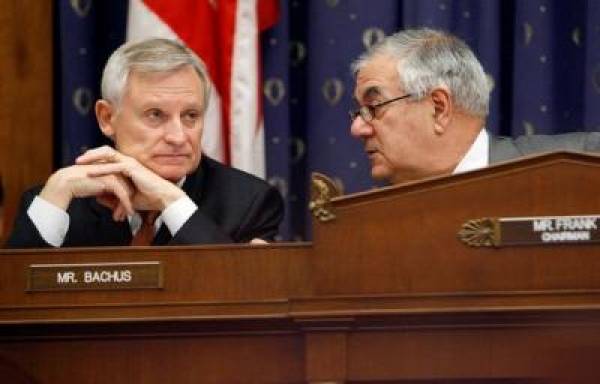Professor Accuses Spencer Bachus of Using "Scare Tactics"

Says Spencer Bachus incorrectly cited the university's research on gambling addiction in arguing for the continued prohibition on online gambling.
Dr. Jeffrey L. Derevensky, a leading professor at McGill University, contends that Rep. Spencer Bachus (R-Ala.) incorrectly cited the university's research on gambling addiction in arguing for the continued prohibition on online gambling. Derevensky in fact believes that the regulation of online gambling is an opportunity to put in place safeguards to combat problem and underage gambling.
In a mark up of the Payments System Protection Act (H.R. 5767) in the House Committee on Financial Services on June 25, 2008, Rep. Bachus, citing research at McGill, claimed that one-third of college students who gambled online attempted suicide.
"This assertion, which is reportedly based upon our empirical research, is not predicated upon any factual evidence," responded Derevensky in an interview with the Safe and Secure Internet Gambling Initiative. "None of the studies conducted with adolescents or college students, to the best of my knowledge, have looked at a connection between Internet wagering and suicide attempts." Derevensky raised these same concerns in a letter sent last week to Reps. Bachus and Barney Frank (D-Mass.)
Derevensky believes there is an opportunity for Congress to better protect consumers in a regulated environment. "If Congress is serious about minimizing the threat posed by Internet gambling, it should look to create an environment where Internet gambling operators are required to put in place safeguards that protect against compulsive and underage gambling."
Last week, a study conducted jointly by the University of Western Ontario and University of Nevada, Las Vegas called for the legalization and regulation of online gambling.
"Just as legalized commercial gambling in casinos allows for governments to regulate it, so, too, could the legalization of online gambling allow for better regulation and attempts to reduce the growth of problem gamblers," said June Cotte, associate professor at the University of Western Ontario, as reported by Poker News.
Existing technology and security controls have already proven to be effective in addressing compulsive gambling. Safeguards currently available in the industry include the ability to control the amount of money wagered, set limits on amounts bet and amounts lost, restrict the duration that someone can play, identify and stop players whose gambling patterns seem out of the ordinary, and allow for consumers to be excluded from online gambling.
"It is disappointing that Rep. Bachus is using scare tactics and false claims in an attempt to justify why Congress should limit my ability to gamble online," said Jeffrey Sandman, spokesman for the Safe and Secure Internet Gambling Initiative. "We are encouraged by the academic community's support of Internet gambling regulation. They emphasize the important point that consumers will be better protected if there are safeguards put in place to combat underage and problem gambling."
The Internet Gambling Regulation and Enforcement Act of 2007 (H.R. 2046), introduced by Rep. Frank, would establish an enforcement framework for licensed gambling operators to accept bets and wagers from individuals in the U.S. It includes a number of built-in consumer protections, including safeguards against compulsive and underage gambling, money laundering, fraud and identity theft. A companion piece of legislation that would ensure the collection of taxes on regulated Internet gambling activities, the Internet Gambling Regulation and Tax Enforcement Act of 2008 (H.R. 5523) was introduced by Congressman Jim McDermott (D-WA).
Additionally, Rep. McDermott introduced last week, the Investing in our Human Resources Act (H.R.6051), which would direct new revenue generated by regulated Internet gambling activities to be spent on job training for those in the declining sectors of the economy and educational assistance for foster care youth. The bill also includes provisions to encourage responsible Internet gambling behavior and an awareness of unsafe practices, something which has been praised by problem gambling advocates.
"Though I support the dedication of resources to raise awareness about problem gambling, I encourage Congress to also provide appropriate funding for research, treatment and the prevention of problem gambling," added Derevensky.
Bachus provided one of the most memorable quotes at last month's House Committee Hearing.
"You Just Click Your Mouse and Lose Your House" - referring to online gambling's alleged addictive nature.
There was also a memorable exchange between Congressman Bachus and Radley Balko before Congress on Internet Gambling.
Mr. Bachus: Are you familiar with Ross Boatman's biography on [Full Tilt Gambling's] website?
Mr. Balko: No, I'm not.
Mr. Bachus: Let me tell you about him. [Reading from bio.] Ross was 10 years old when he played poker for the first time. His brother Barney, who is a little older than Ross, was playing with some friends, and after much pleading, they let him sit in.
His gambling career really didn't get started until a couple of years later, though, when he was 12 years old. Ross was too young and didn't have the money to play with those guys-I guess they're talking about his 14-year-old brother-but they let him sit and watch, and he learned plenty.
[Bachus, now looking at Balko.] I guess the verification system didn't work.
Mr. Balko [flummoxed]: I believe that all took place well before the age of Internet gambling, Congressman.
Mr. Bachus: Okay. Was it? I wonder why it's still on the site today
Bachus has a mostly, but not totally, conservative voting record, and has been an aggressive lawmaker and investigator. During his tenure as Chairman of the Banking Oversight Committee, he uncovered the Community Development Financial Institute (CDFI) incident during the Clinton administration, which led to the resignation of the top two CDFI officials. Although less adversarial during the Bush administration, he has remained an active legislator, helping to amend the Fair Credit Reporting Act to curtail identity theft and ease consumer access to their credit reports. He also has a reputation for good constituent service.
On December 14 2005 he voted for the reauthorization of the Patriot Act. On June 29 2005 he voted for the increase of funds by another $25 million for anti-marijuana print a TV ads. On October 6, 2005 he voted for the Department of Homeland Security.













